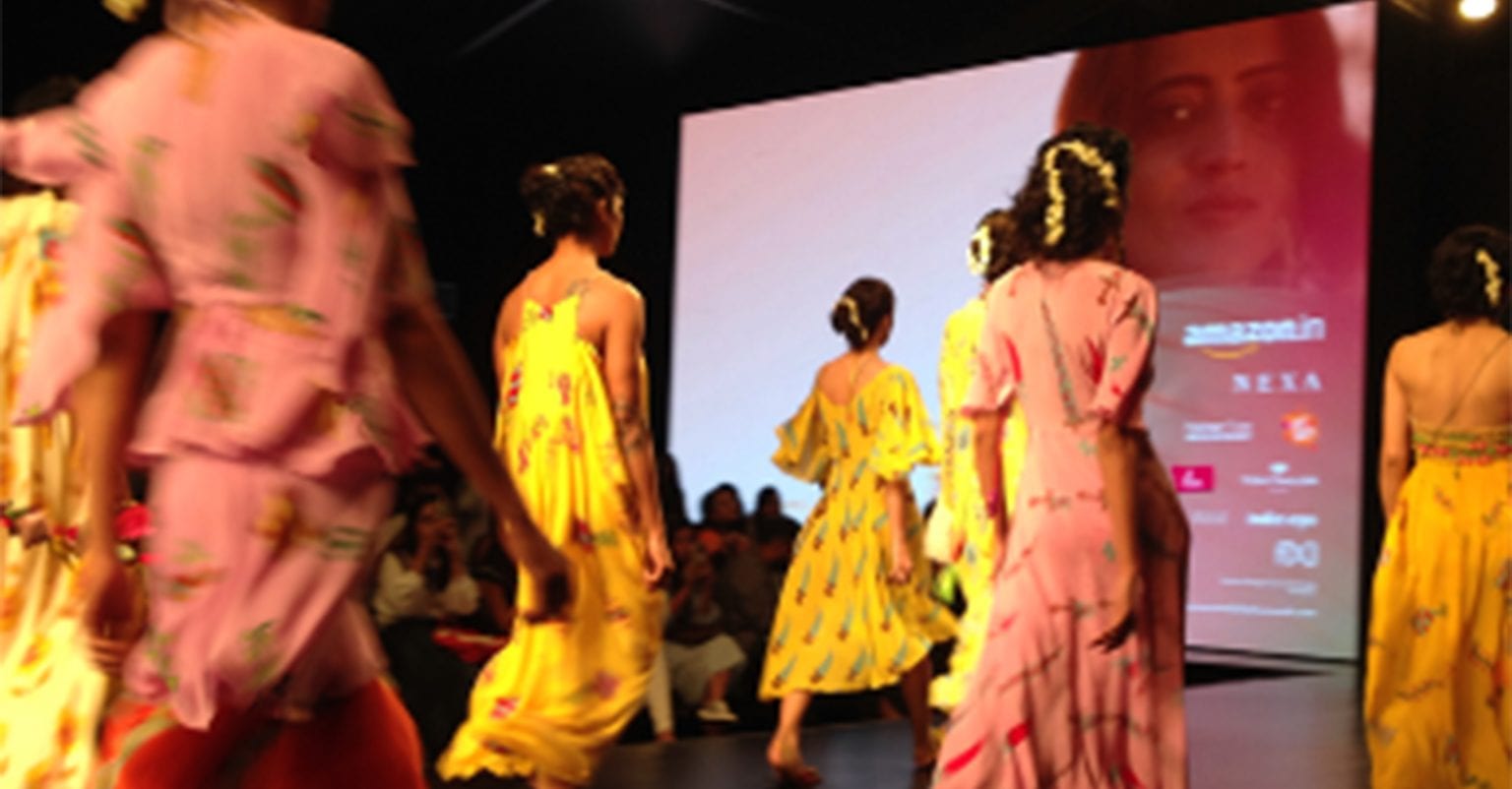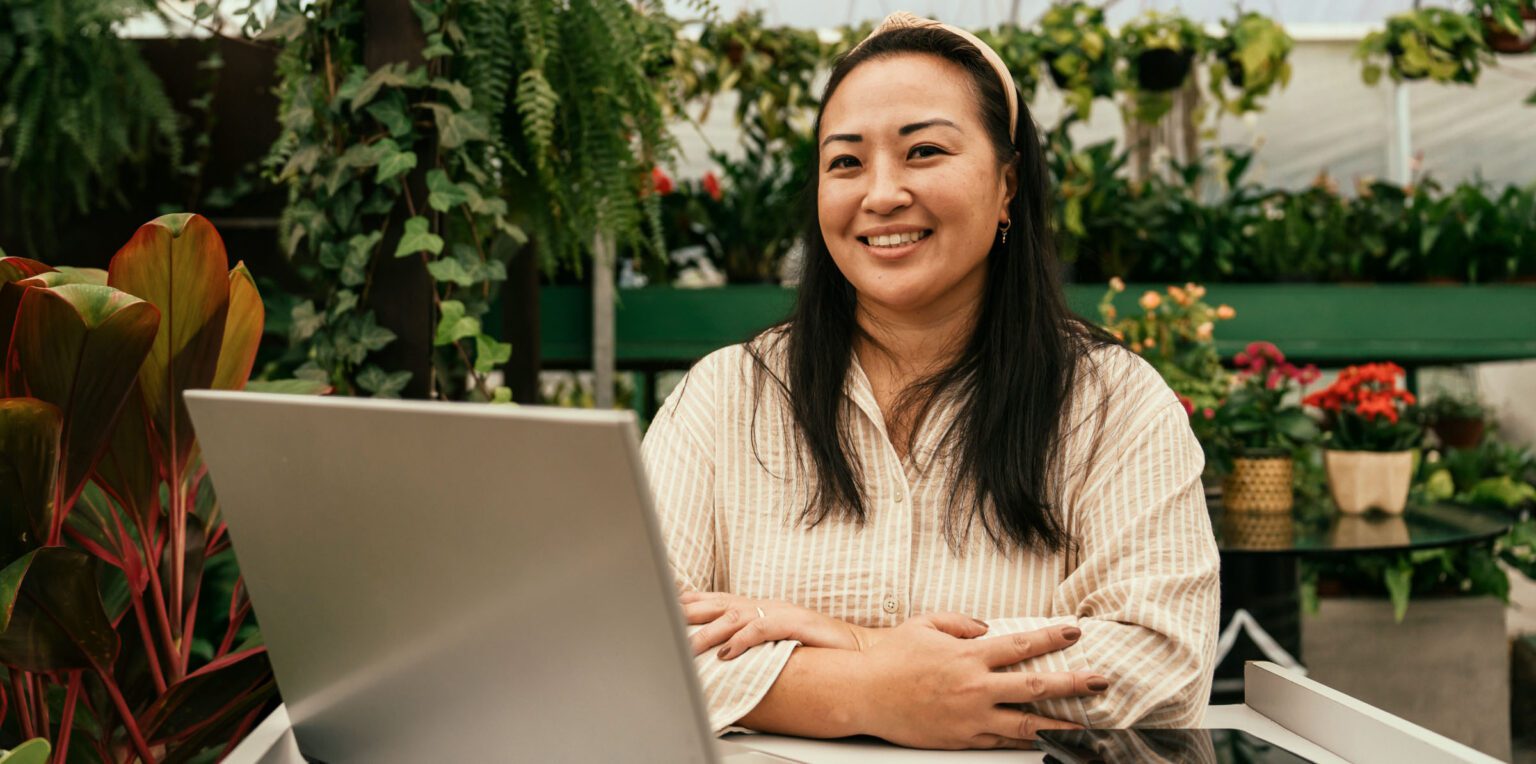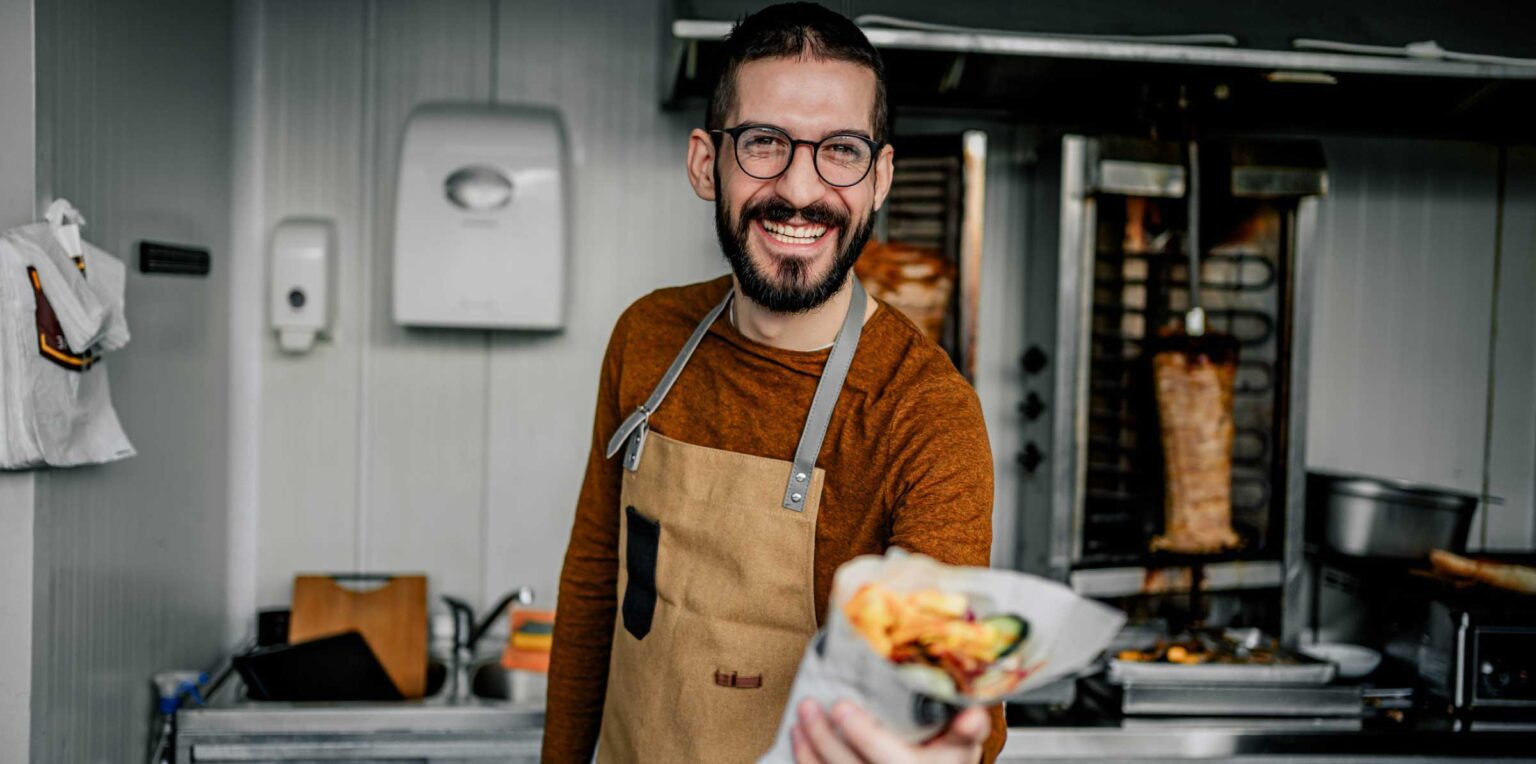She dreamed of being in the film industry but knew when to take an opportunity that was right across the road from her. Mary Read started out in one iconic Sydney boutique then created her own.
This is the 8th installment of Prospa’s ‘I wish someone had told me that’ series, where we speak with seasoned small business owners to hear their advice on growing a business and what they wish they were told along the way. Click here to read the rest of the ‘I wish someone had told me that’ series.
Mary Read, founder of Reads in Sydney’s Woollahra, has experienced the highs and lows of Australia’s fashion retail industry up close. From the golden age of Australian design to the tough times of the Australian dollar reaching parity, from the thrill of introducing ethically made products to her customers, to the challenge presented by huge shopping malls – through it all Mary has found ways to make her business thrive.
It all started with made-to-measure bikinis
It was 1974 and I was 19 years old. I was studying interior design at TAFE and working part-time at Sydney’s iconic Frangipani boutique in Woollahra. It stocked some of Australia’s biggest fashion names at the time including Prue Acton and Rae Ganim. Part of my job was to measure up clients for custom-made bikinis in beautiful prints and fabrics. One day I made a $91 sale – seven shirts in a different colour for $13 each. That was a big sale!
At the end of that year, I left home to live with my boyfriend and started working full-time at Frangipani. I did well at TAFE but the course just wasn’t right for me. I tried out for NIDA and started an Arts degree at the University of NSW. But again, it just wasn’t for me. By then I was older than most of the students and I was out there living life, going to clubs, hanging out with drag queens, growing up and finding myself. I was very streetwise! It would be some years before I finally returned to study.
In 1976 my dad and I opened Reads Town and Country Wear. Dad was a lawyer but had always been interested in retail. A shop had come up for lease in Woollahra, so we decided to give it a go. We sold menswear and riding gear. We’d always been horse riders when we lived in the country so there was a strong connection there for us with that world.
It wasn’t easy. Most days I just had friends drop in to chat because it was so quiet!
Then in 1978 Frangipani came up for sale for $25,000. It was a wise decision my family made to buy that iconic store. I brought over the menswear (which I eventually stopped selling) and Reads is still there today on Queen Street.
I lost money and then I made money
Then I lost money. Then I made money. That’s the nature of the business.
It’s been a real challenge especially since the GFC to bring the business back. When the Australian dollar reached parity with the US dollar around 2010, it got really bad. People who had never travelled before were suddenly travelling two or three times a year and doing all their clothes shopping in the US. Australia lost a huge amount of its local spend. The impact it had was shocking. We lost a lot of beautiful imports and good designers. The middle-upper price point just wasn’t available and clothes got really generic and unattractive for a while.
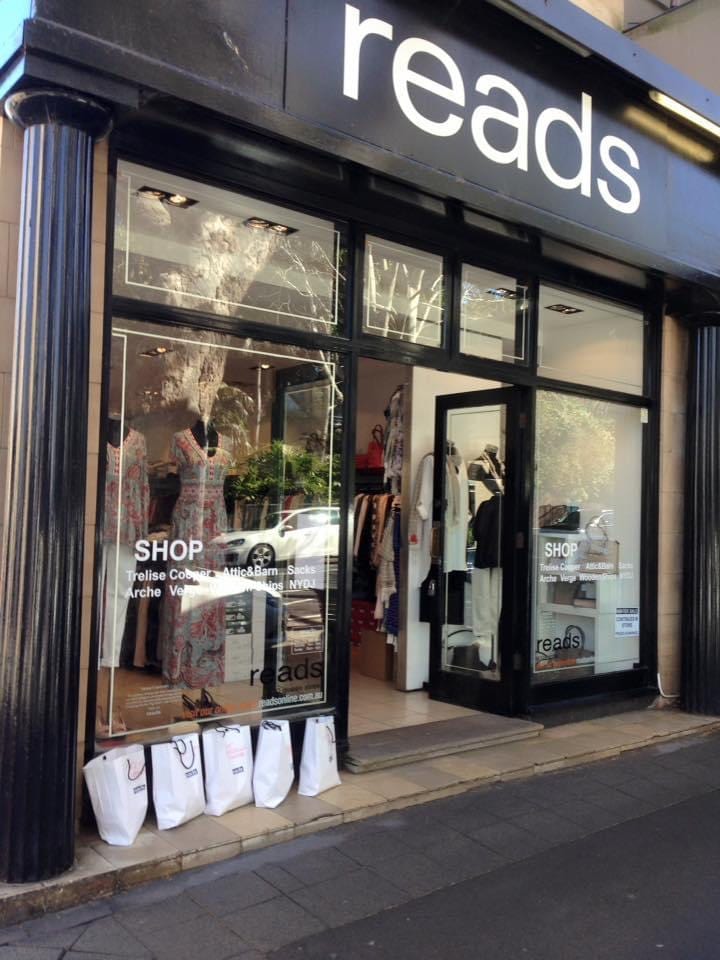
Major shopping centres had a dramatic effect on boutiques like Reads, Mary’s store on Queen St in Woollahra.
Bigger shopping centres also had a dramatic effect on boutiques like mine. They just decimated Sydney’s Oxford Street which had once been an iconic shopping destination. And the shopping mentality changed. I went to check out one of the big new shopping malls once and saw people come out of Coles with all their groceries then go into one of the major women’s chain stores and pick up a cheap top. All of that everyday dollar got dispersed – it wasn’t coming to the boutiques anymore.
I remember sitting with a well-known Australian designer one day in 2015 and saying, “That’s it. I’m not doing this anymore. I’m going to close. I can’t do it anymore.”
But you have these crises and then you pull yourself together and find a way out. And that’s what I did.
I went to Fashion Week in India that year, and visited Mumbai, Delhi and Jaipur. That really inspired me, and I ended up working with two designers there to bring beautiful products into the store. It worked well and gave us something different to offer.
I took the business online pretty early
I knew the time was coming. I might not be the kind of person who makes a five-year plan, but I’ve always been contemporary, good at looking ahead and seeing what’s on the horizon. I’m a good researcher and I have an inquisitive mind – and I’m pretty tech savvy for a 66-year-old!
So we started the online store in 2011. Our customers use it a lot before coming in-store to buy and, of course, it grew significantly during COVID. We’ve built a big customer database and have a solid open rate for mail outs. Connecting with new customers is always a challenge but Facebook is our best platform for that.
Going digital changed everything. Where once I would have spent $10k on an ad in Vogue magazine, now it all goes into digital marketing. But it takes a lot of bucks to create good ecommerce. I tried working with a big company, but they just couldn’t deliver to small business. So I do as much as possible with the lowest dollar and am lucky to have great staff on board.
I wish someone had told me that I should learn how to read a balance sheet
Being more accounting-savvy would have been useful. But otherwise, there isn’t really anything I wish I’d been told. I’ve learned so much. And I know when to follow my gut instinct. Would I do it all again? Yes.
It’s frustrating not always being able to access beautiful quality clothing that is wearable and ethical. But I try not to get too frustrated. It doesn’t do anyone any good. I like trying to figure out solutions to those kinds of challenges. That’s half the driving force.
And I’m always inspired by the fabulous women I’ve met along the way. Some of my customers are the women I fitted for bikinis all those years ago.
Social responsibility is very important to me
I’ve worked six days a week for 45 years, so having other passions matters a lot.
In my late 30s and into my 40s I did a diploma of community welfare, and a master’s degree in international social development at the University of NSW.
I ran a not-for-profit called Cambodia House for nearly 10 years and have worked with underprivileged women in different communities. I’m on the board of Cambodian Living Arts and am closely engaged with the Sydney Festival.
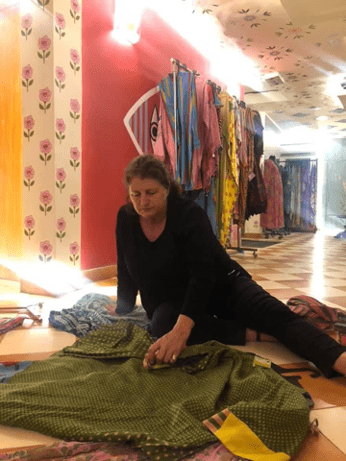
Mary’s last trip to India before COVID was in November 2019, when she visited the studio of Anupamaa Dayal.
We didn’t close at all during COVID
We stopped trading on Sundays and closed a little earlier. But we kept going.
Was it hard? Yes. But it also gave us a minute to breathe and to reflect. It was like peeling off coat after coat after coat. And with each one, I felt more relaxed. I even got time to spend on my ‘COVID garden’ at home!
And I learnt to do things more simply, to strip back a lot of layers and focus on the core of the business. There was a lot of uncertainty – we never knew what would come into stock, especially with our Italian suppliers. We had to try different ways of doing things, like buying stock in season rather than making indent orders.
The lockdown in December in Sydney had a big impact – no interstate tourists coming to see their families. It was a tough time. But they came back early in 2021. I remember thinking how nice it was to have some Queenslanders in the shop!
Now is the time to get back on track, to hope COVID stays under control, to evolve and grow the business, and to keep reflecting. That’s important – taking the time to reflect and understand what matters and what works.
Speak with one of our small business lending specialists about how a Prospa Small Business Loan could help you make the changes that will take your business to the next level.
